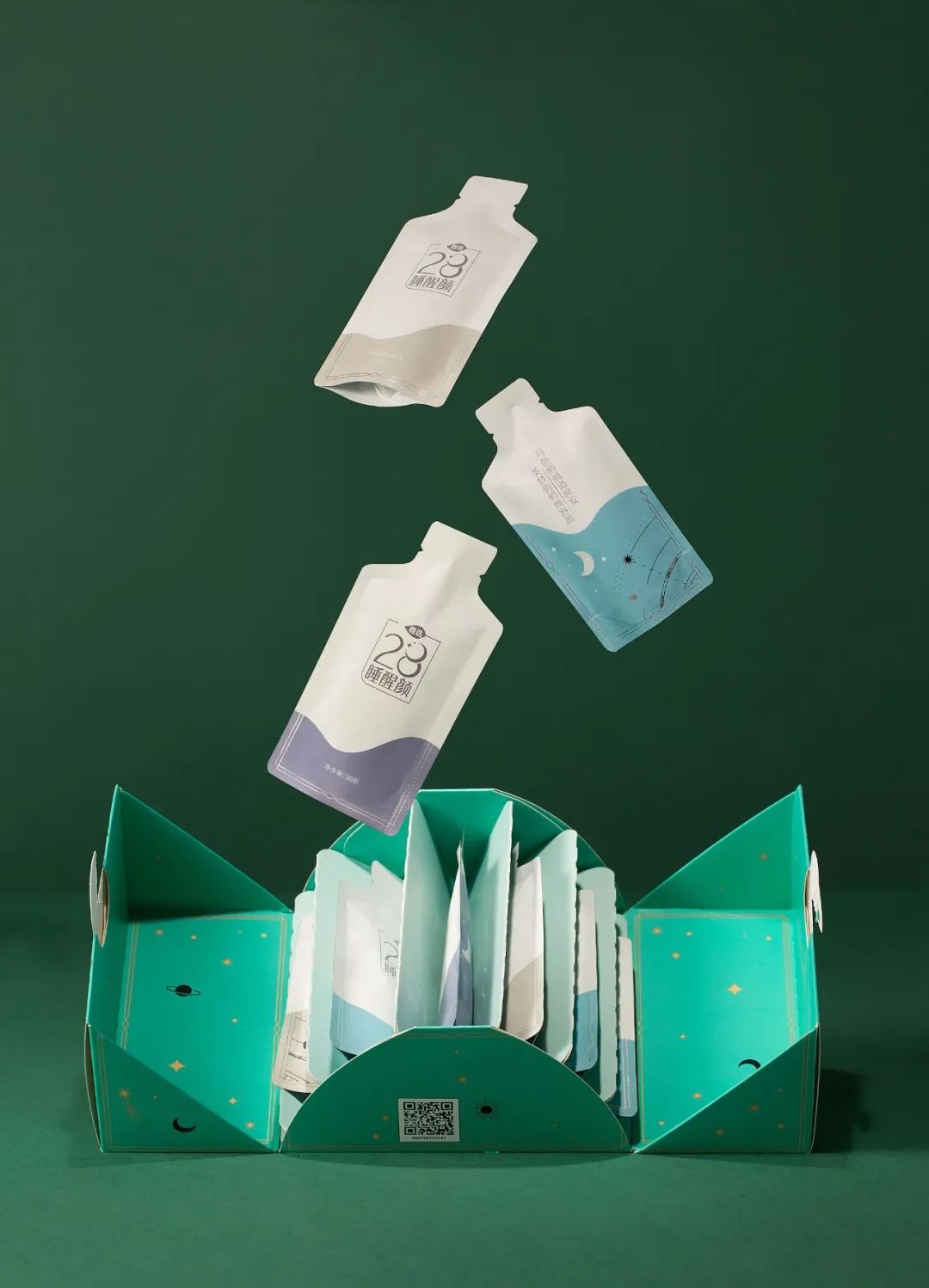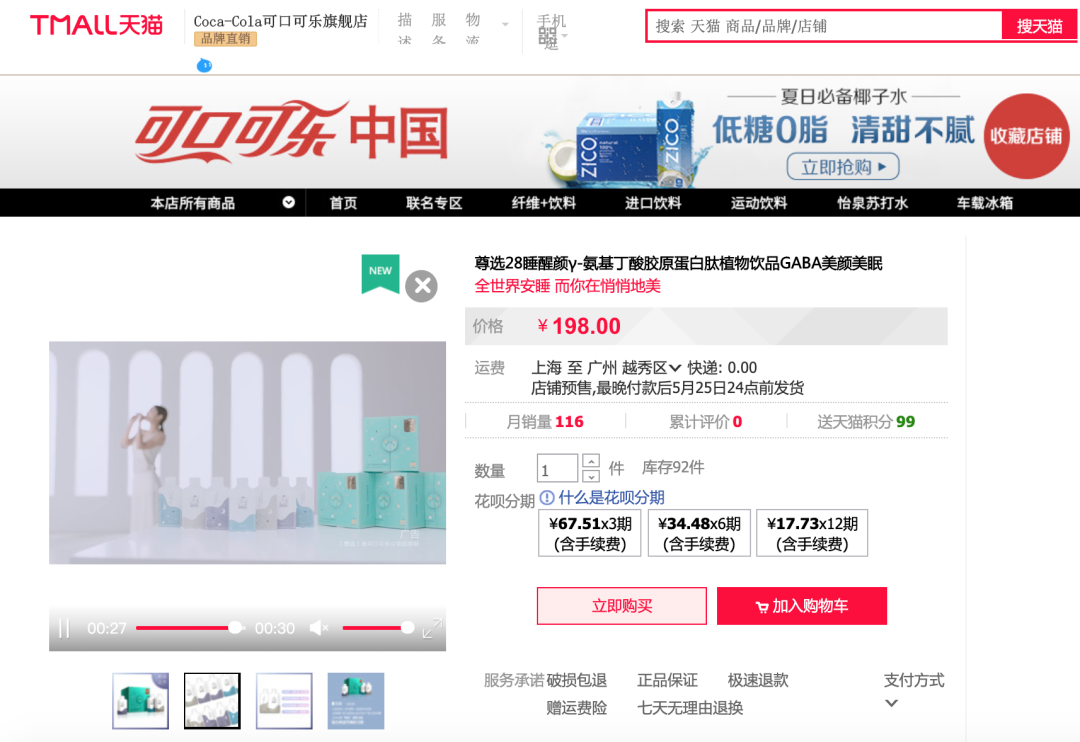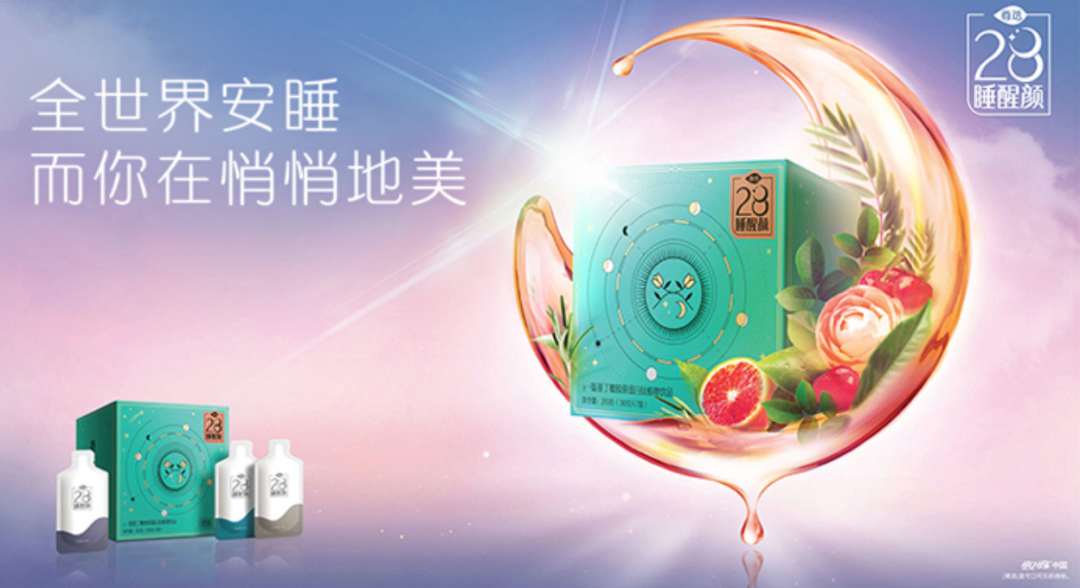This time, Coca-Cola has created a “special” beverage for social e-commerce. “>” snacks Generation “(ID: foodinc) , author: He Danlin.
While expanding the segmented beverage category, the beverage giant Coca-Cola has also turned its attention to the new opportunities of the “social e-commerce” segment channel.
Small food generation noticed today that the Coca-Cola Tmall flagship store has launched a new product “Zunxuan 28 Sleep Waking Face” in a low-key manner. This is a brand new brand launched by the company in the botanical beverage category. The page shows that it is positioned as a “sleep beauty” beverage.
Coca-Cola China responded today to the snack code that the new product was officially launched on Tmall on May 20, and is also available nationwide through social e-commerce online channels. It is worth noting that this is Coca-Cola China’s first foray into social e-commerce.

Coca-Cola ’s new plant beverage for social e-commerce channels “Zunxuan 28 Sleep Waking Face”
“Social e-commerce is an emerging retail channel in the past two years. At the same time, the plant beverage segment has category development space and potential in China.” The company told Xiaoshidai that this time is based on these two consumer insights And launched new products.
New plant beverages
This is Coca-Cola’s latest attempt to expand in the plant beverage segment, but it has been planned for a long time. The company told Xiaopin today that it took about two years from product concept, R & D, opening up the supply chain to the official listing, and was independently developed by Coca-Cola’s local Asia-Pacific Technology and Innovation Center in Shanghai.
It is worth noting that this new product has many “breaking conventions” in the Coca-Cola China system. Obviously this beverage giant is trying to use lighter and more flexible business models to seize innovation opportunities.

For example, in terms of production, “Zunxuan 28 Sleep Awake Face” is not produced by Coca-Cola China’s bottling partner, but instead chooses the form of processing. “Coca-Cola China is responsible for product development, global raw material procurement and supply, and brand management. In addition, we entrust a qualified third-party foundry factory to produce and process and face the market.” The company told Xiaoshidai.
Public information shows that this third-party foundry factory Damin Food mainly produces instant tea powder and various plant extracts. It is a raw material supplier for many beverage companies such as Coca-Cola, Pepsi, Nestlé, Lipton and Master Kong.
Small food generation search on Tmall platform, the new product is designed to be ready to drink in bags, not sold in single bags, but launched a box of seven bags of “one week”, priced at 198 yuan.

Unlike common plant drinks such as soy milk and coconut milk, this new product contains γ-aminobutyric acid, collagen peptides, imported blood orange powder, as well as herbal ingredients such as white fungus, lotus seeds, and wolfberry. It can be seen that many of the ingredients are common dietary supplements.
Interestingly, it is positioned as a “beauty and sleep” drink. It is understood that because γ-aminobutyric acid “has an inhibitory effect on the excitatory neurons of the central nervous system”, it may cause sleepiness after drinking, so it is recommended that consumers drink it half an hour before going to bed, while driving, testing, meeting Not recommended for occasions.

“In the different development stages of product concept, taste, packaging, brand connotation, etc., we have adopted online survey questionnaires and offline group interviews to communicate with consumers, and have also carried out actual product-to-home tasting tests to further Optimize product details. “Coca-Cola China told Xiaoshidai today.
Try water social e-commerce
Coca-Cola China said to Xiaoshidai that it will test some new marketing methods such as social marketing and live broadcasting for the characteristics of the product, and said that this is the company ’s first step in the field of social e-commerce. try”.
According to reports, Shandong Zhuangdie is the exclusive online distributor of “Zunxuan 28 Sleep Wake Up” products and will be responsible for the promotion, operation and sales of the products. It is understood that Shandong Zhuangdie is in the companyThe “economy” field has “extensive experience”, and the two parties ’capabilities complement each other in water testing in this field.
When asked if there will be more new products for the “social e-commerce” channel in the future, Coca-Cola China said that if there are plans in the future, it will be shared with consumers.

“We are accelerating the transition to a consumer-focused full-category beverage company. Social e-commerce is an emerging retail channel in the past two years, and we look forward to exploring new subdivision categories and channel models and trying a series of new products In order to meet the diversified needs of Chinese consumers in the digital and multi-dimensional era. “The company said that in the future, it will adjust products and models in a timely manner based on test results and consumer feedback.
This is not the first food and beverage giant to test the social e-commerce.
For example, Social e-commerce growth three major themes to jointly explore innovative solutions and business practices.

In recent years, social e-commerce is indeed a new trend appearing on the channel. In simple terms, it can be understood as a new sales channel based on community, live broadcast, etc., to obtain traffic through social networking, and finally realize the sale of cash.
The rise of “Pindian School” Pinduoduo and the “Planting School” Xiaohongshu, as well as e-commerce giants such as Ali, JD.com, Suning, etc., have deployed Taobao, Jingxi, Suning to push customers, all let social e-commerce It is getting more and more attention. Xiaoshidai noticed that recently, Tencent, which is not good at e-commerce but has two social media platforms WeChat and QQ, has also launched a small purchase program “Little Goose”.
The China Consumer Market Trend Report released by the market research company CCTV Market Research (CTR) in September 2019 shows that as of the first half of last year, the annual growth rate of China’s fast-moving consumer goods market reached 5.4%. According to statistics, the WeChat channel’s food and beverage penetration rate reached 14%, and the WeChat channel’s contribution to food and beverage sales growth increased from 6% in 2017 to 16% in 2018. Social e-commerce, online celebrity live broadcast, and social media have become FMCG sales New approach.